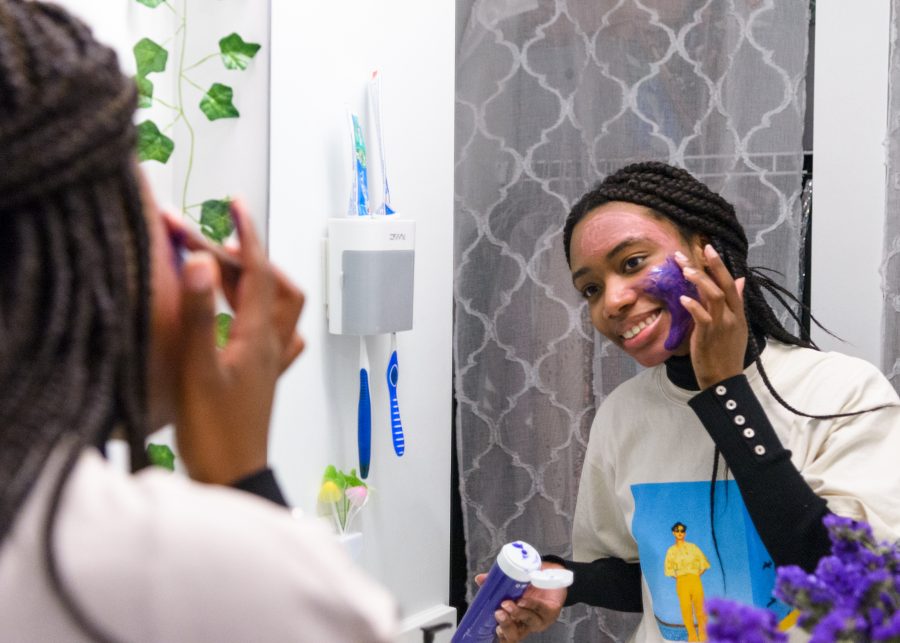Every winter, we all find ourselves in what some would call the winter blues, or in other words, seasonal depression. It’s more common than one might think, with five percent of the U.S. population currently suffering from it. Onset begins as early as 20 years old, sometimes even earlier (1). Even if you aren’t diagnosed with seasonal depression, many still experience symptoms associated with it in the winter time. While the start of spring is coming closer, we can’t exactly rely on Boston weather to be getting warmer. So you may be asking yourself, how can I still take care of myself without going outside in the bitter cold winter? Well I am here to help you come up with an answer.
Exercising your mind while also not wanting to get out of bed is easier than it sounds. Instead of mindlessly scrolling through social media, try solving a puzzle like a sudoku or a crossword on your phone using apps like Sudoku.com, Sudoku Puzzle or New York Times Crossword. You could also play the ultra-popular game Wordle on The New York Times website or any of its many variations, like Wordle Unlimited. If you’re able to get out of bed, try completing a jigsaw puzzle while listening to music or an audiobook.
Even though reading a book may sound tiring, listening to an audiobook makes the task a little less challenging and can also be done while simultaneously staring at the ceiling and contemplating life. Listening to an audiobook is also a good way to distract yourself from any negative thoughts you may be having. Try using the app Libby and create an account through Boston Public Library to find thousands of audiobooks for free.
Another way to keep your mind active is listening to podcasts. They may seem boring to anyone who hasn’t listened, but once you look into them, it’s not hard to find one you will like. If you want to listen to one focused on self-improvement, try “The Mindful Kind,” hosted by Rachel Kable. Listening to it is like a free, five-minute version of therapy. You could also try one that will make you laugh like “Zane and Heath: Unfiltered,” with Zane Hijazi and Heath Hussar, or “Goes Without Saying,” with hosts Sephy and Wing. Podcasts are easy to have playing in the background of whatever you are doing.
Keeping your body healthy revolves around your diet, your cleanliness and your exercise. Treat yourself like you would a beloved pet. Make sure you are eating right, not just eating fast food because it’s easiest. Everything is okay in moderation, just make sure your diet is diverse in foods. If you eat fast food often, try limiting yourself to having it once or twice a week instead of every day, as well as incorporating fresh foods into your meals. Try to always have nutritious food on hand so you won’t be eating fast food out of convenience. Another option is bringing your own lunch or grabbing a healthier option from the dining hall rather than eating Burger King or Dunkin’.
In regards to cleanliness, try to tidy up your room a little bit at a time. No one really talks about the difficulty of completing basic tasks like showering, keeping your room clean or brushing your teeth when you are depressed, but it is very common. When viewing these tasks, don’t see them as one big thing you have to do, but break them down step-by-step, even if these steps are as small as putting toothpaste on your toothbrush. It helps to make them seem not as monumental.
Getting daily exercise is really difficult if you’re even having trouble getting out of bed, but it really is necessary. Try to make even small adjustments like taking the stairs instead of the elevator or doing jumping jacks right when you get out of bed to wake yourself up. Incorporating just a little bit at a time makes it seem like not such a big thing to do.
Another factor that could be contributing to your depression is your vitamin levels. Talk to your doctor to check your levels and see what you can do about balancing them. A common vitamin deficiency in the winter is vitamin D, due to lack of direct sunlight. While this isn’t always the case, your doctor can help and get you on the necessary vitamins and medicines that could make you feel a bit better.
Depression is a lot more difficult than the world makes it out to be. It can be an exhausting task just to get out of bed. Whatever you can do to make it a little bit easier on yourself is worth your time. With spring coming up, try to get outside for a few minutes on warmer days. You may see a big difference in your mood.
1. https://www.mhanational.org/conditions/seasonal-affective-disorder-sad

